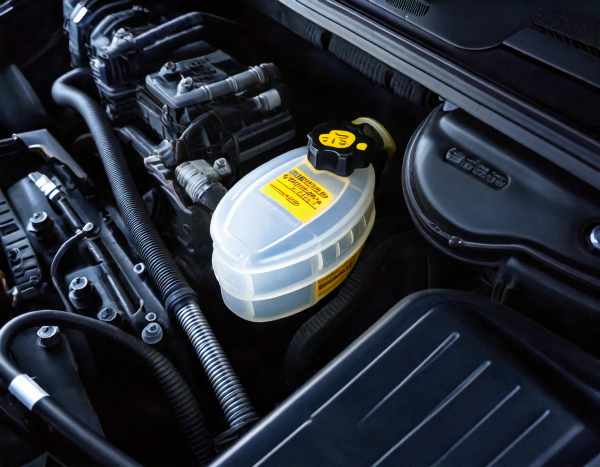Brake fluid is one of the most critical yet overlooked components in a vehicle’s braking system. Without it, your brakes wouldn't function properly, putting your safety at risk. At Banno Auto Repair Ltd. in Calgary, we emphasize the importance of regular brake fluid maintenance to ensure your vehicle remains safe on the road. In this comprehensive guide, we’ll explore everything you need to know about brake fluid, including its role, properties, and why timely replacement is essential.
What Is Brake Fluid?
Brake fluid is a hydraulic fluid used in a vehicle’s braking system. It is responsible for transmitting the force applied on the brake pedal to the braking components at the wheels. Without brake fluid, the pressure from your foot wouldn’t effectively reach the brakes, leading to failure in stopping the vehicle.
Brake fluid is specifically formulated to function under high temperatures and pressures. It plays a crucial role in keeping the braking system responsive and ensuring your vehicle stops safely when needed.
There are different types of brake fluid, commonly categorized as DOT 3, DOT 4, DOT 5, and DOT 5.1. These classifications indicate the fluid's boiling point, viscosity, and compatibility with different braking systems.
What Is Brake Fluid Used For?
Brake fluid serves several key functions within the braking system:
- Transfers force - It converts the pressure from the brake pedal into hydraulic pressure that activates the brake calipers or wheel cylinders.
- Lubrication - It helps keep the braking system’s moving parts properly lubricated, reducing wear and tear.
- Corrosion prevention - Brake fluid contains additives that prevent rust and corrosion within the braking system.
- Heat resistance - It can withstand high temperatures generated during braking without evaporating or degrading.
- Ensures responsiveness - The fluid's incompressible nature ensures that even a light press on the pedal translates into a quick braking response.
How Does Brake Fluid Work?
When you press the brake pedal, it activates the master cylinder, which pressurizes the brake fluid. This hydraulic pressure is then transmitted through the brake lines to the brake calipers (for disc brakes) or wheel cylinders (for drum brakes). The pressure forces the brake pads or shoes against the rotors or drums, creating friction that slows down and stops the vehicle.
Because brake fluid is incompressible, it ensures that even a light press on the pedal results in immediate brake response. However, if the fluid becomes contaminated or loses its effectiveness, braking performance can be compromised.
Properties of Brake Fluid
To perform effectively, brake fluid must have specific properties:
- High Boiling Point - Since braking generates a significant amount of heat, brake fluid must resist boiling. If it boils, air bubbles form in the lines, causing brake fade or failure.
- Non-Compressibility - Brake fluid must remain incompressible under pressure to ensure consistent brake performance.
- Corrosion Resistance - It contains additives that protect metal components from rust and corrosion.
- Hygroscopic Nature - Brake fluid absorbs moisture over time, preventing water from pooling in the braking system and causing corrosion.
- Compatibility with Brake Components - It must not damage rubber seals, hoses, or metal components within the system.
When Should You Change Your Brake Fluid?
Brake fluid should be changed periodically to maintain optimal performance. Over time, it absorbs moisture, which lowers its boiling point and increases the risk of brake fade or failure.
Here are some general guidelines for when to replace brake fluid:
- Every 2 to 3 years or as specified by your vehicle manufacturer.
- When brake fluid becomes dark or cloudy, indicating contamination.
- If you experience a soft or spongy brake pedal, which could indicate air or moisture in the system.
- After a brake system repair or replacement that involves opening the hydraulic system.
- During routine maintenance, if a mechanic notices signs of degraded fluid.
What Happens If You Don’t Change Your Brake Fluid?
Neglecting to change your brake fluid can lead to several issues:
- Reduced braking performance - Moisture contamination lowers the boiling point, leading to brake fade.
- Corrosion and damage to brake components - Water in the system can cause rust, leading to costly repairs.
- Increased wear and tear - Contaminated fluid can damage seals, hoses, and other braking system parts.
- Complete brake failure - In severe cases, old brake fluid can cause air bubbles in the lines, leading to total brake loss.
Conclusion
Brake fluid is a vital component of your vehicle’s braking system, and regular maintenance is essential to ensure safety and performance. If you haven’t had your brake fluid changed recently, now is the time to schedule a service. At Banno Auto Repair Ltd., we provide professional brake fluid replacement services to keep your vehicle in peak condition. Contact us today to book an appointment and drive with confidence!

